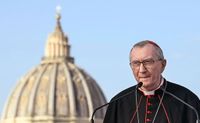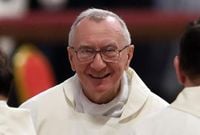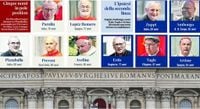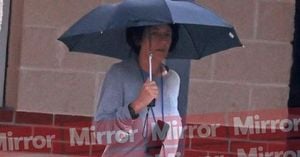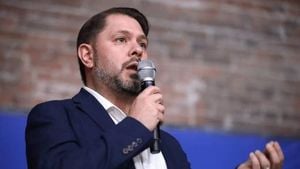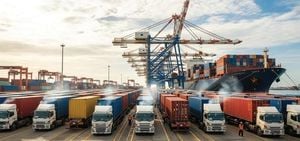As the Vatican prepares for the pivotal Conclave to elect the next Pope, Cardinal Pietro Parolin emerges as a frontrunner amidst a backdrop of geopolitical challenges and church reform. Born on January 17, 1955, in Schiavon, Italy, Parolin has been a significant figure in the Catholic Church, particularly as the Secretary of State under Pope Francis since 2013.
Parolin's journey began in a devout Catholic family, where he experienced a profound loss at the age of ten when his father died in a car accident. This tragedy shaped his early life and led him to pursue a vocation in the priesthood. He was ordained in 1980 and began his diplomatic career for the Vatican in 1986, eventually rising to the role of Undersecretary for Relations with States from 2002 to 2009.
His diplomatic acumen has been recognized globally, especially with his pivotal role in the rapprochement between the Holy See and China, which culminated in a secret agreement on the appointment of bishops in 2018. This agreement, renewed multiple times, has drawn criticism from various factions within the church, particularly from those who feel it compromises the Vatican’s stance against the Chinese Communist regime.
As the Conclave begins on May 7, 2025, with 133 cardinal electors from 71 countries, Parolin is seen as a candidate who could unify the church in a post-Francis era. The first official act will be the 'Pro eligendo Pontifice' mass at St. Peter's Basilica, followed by the voting process, where the required quorum for election is set at 89 votes—the highest in history.
According to various observers and betting agencies, Parolin is favored to secure between 40 to 60 votes in the initial round. His supporters include influential figures such as Angelo De Donatis and Marcello Semeraro, who believe his experience and diplomatic skills are crucial for the church's future.
However, the Conclave is not without its complexities. A silent majority of about 70 votes from Asia, Africa, and Oceania may play a critical role in determining the outcome. This group, while not sufficient to elect a Pope alone, holds significant sway in the discussions and could influence the direction of the voting.
Other notable candidates include Cardinal Luis Antonio Tagle, often referred to as the 'Asian Bergoglio,' and Cardinal Jean Marc Aveline, the archbishop of Marseille. Both are seen as potential successors who resonate with the populace's needs. Tagle, in particular, is viewed as a candidate who understands the challenges faced by the church's followers worldwide.
In a potential negotiation that could unfold during the Conclave, there are discussions about an agreement between Parolin and Tagle, where Tagle might step aside in exchange for a significant position within the Vatican, possibly as Secretary of State. This kind of strategic alliance could streamline the voting and help solidify Parolin's position as the leading candidate.
While Parolin's candidacy appears strong, the dynamics of the Conclave could shift rapidly. Historical precedents suggest that alliances and negotiations often shape the outcome more than initial popularity. The memory of the 2005 Conclave, where two leading candidates withdrew to allow for a compromise, looms large over the proceedings.
The first vote is expected to take place around 7 PM on the opening day of the Conclave, but experts caution that an immediate election is unlikely. The initial vote will serve as a gauge of support for the various candidates, with subsequent votes taking place daily until a consensus is reached.
As the cardinal electors gather, they are also mindful of the broader issues facing the church, such as the ongoing conflicts in Ukraine and the Middle East, which Parolin has emphasized should be approached through dialogue rather than imposition. His commitment to peace aligns with Pope Francis's vision and could resonate with those seeking continuity in leadership.
The atmosphere in the Vatican is charged with anticipation, as many believe that the next Pope will need to navigate not only the internal dynamics of the church but also its role on the global stage. Parolin’s extensive experience and established relationships may prove invaluable as the church seeks to maintain unity and address pressing global issues.
In addition to Parolin and Tagle, other candidates like Cardinal Matteo Zuppi and Cardinal Fridolin Ambongo are also in the mix, each bringing their unique perspectives and support bases. As the voting progresses, it will be crucial to observe how the silent majority and the various factions within the Conclave align their votes.
With the first white smoke anticipated later in the evening, the world watches closely as the cardinals embark on this sacred duty. The outcome will not only determine the next leader of the Catholic Church but also set the tone for its future direction, particularly in how it engages with the modern world.
As the Conclave unfolds, one thing remains clear: the legacy of Pope Francis looms large, and the next Pope will need to embody the spirit of reform and inclusivity that has characterized his papacy. Whether that leader will be Cardinal Parolin or another candidate remains to be seen, but the discussions and negotiations in the coming days will shape the future of the Catholic Church for years to come.
